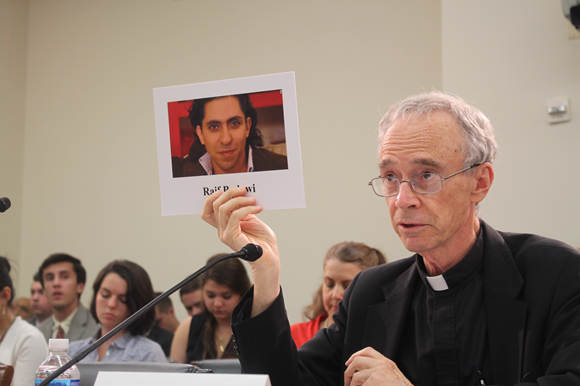SAUDI ARABIA: Release Raif Badawi
Jul 28, 2016

(USCIRF Chair Thomas J. Reese, S.J. holds up a picture of Raif Badawi at a July 2016 Tom Lantos Human Rights Commission hearing on blasphemy laws)
WASHINGTON, D.C. – The U.S. Commission on International Religious Freedom (USCIRF) sadly marks the three-year anniversary of the blasphemy sentence handed down in Saudi Arabia to Raif Badawi, the founder and editor of Free Saudi Liberals, an online forum for diverse views.
“The Saudi government continues to imprison Raif Badawi for exercising his internationally-guaranteed rights of the freedoms of religion and expression. Mr. Badawi is a prisoner of conscience who has languished in prison, away from his wife and children, and has been flogged publicly to punish him and intimidate others,” said USCIRF Chair Thomas J. Reese, S.J. “USCIRF calls on the Saudi government to overturn his unjust sentence, release him immediately and unconditionally, and end the prosecution of individuals charged with apostasy and blasphemy. Belief must not be policed.”
Mr. Badawi was arrested in June 2012 on crimes including apostasy and “insulting Islam” and sentenced on July 29, 2013 to seven years in prison and 600 lashes. In May 2014, a Saudi appeals court retried Mr. Badawi’s case, resulting in a harsher sentence, which the Saudi Supreme Court upheld in June 2015: 10 years’ imprisonment, 1,000 lashes, and a fine roughly equivalent to US$266,000.
On January 9, 2015, Badawi received the first set of 50 lashes. Immediately after the flogging was carried out, several governments (including the United States), USCIRF, and numerous international human rights groups and individual advocates condemned the sentence’s implementation. Badawi has not received additional flogging, partly due to international outrage and partly due to a medical doctor’s finding that he could physically not endure more lashings. Nevertheless, Badawi remains in prison, along with his lawyer, Waleed Abu al-Khair, who was sentenced in July 2014 by a newly created anti-terror court to 15 years in jail after being found guilty of various trumped-up charges related to his work as a human rights defender.
USCIRF sent a letter in June 2015 to Saudi King Salman requesting Raif Badawi’s pardon. USCIRF Chair Reese raised the case of Raif Badawi during a Tom Lantos Human Rights Commission hearing on blasphemy laws.
The Saudi government continues to use criminal charges of apostasy and blasphemy to suppress discussion and debate and silence dissidents. Promoters of political and human rights reforms and those seeking to debate the role of religion in relation to the state, its laws, and society typically have been the targets of such charges.
USCIRF again recommended in May 2016 that Saudi Arabia be designated as a Country of Particular Concern (CPC) for systematic, ongoing, and egregious violations of religious freedom. The State Department has designated Saudi Arabia as a CPC since 2004. However, since 2006, the Department has put an indefinite waiver on taking any action in consequence of the CPC designation. USCIRF continues to urge the U.S. government to lift the waiver.
To interview a Commissioner, please contact USCIRF at [email protected] or 202-786-0615.
